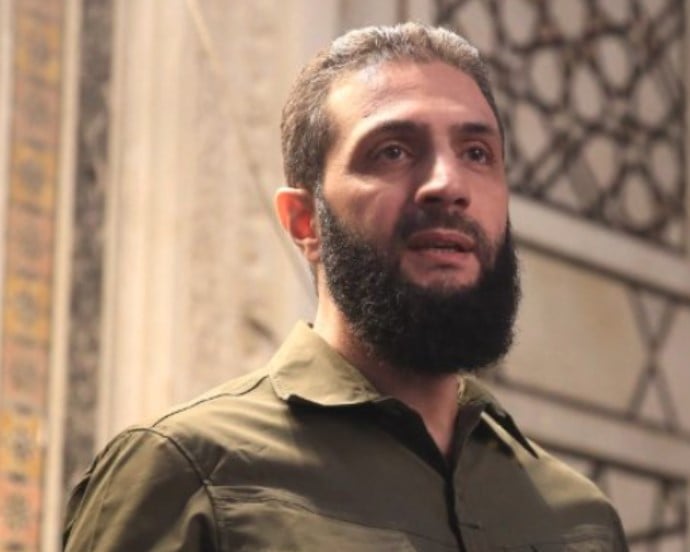
‘We haven’t committed any crimes that justify calling us a terrorist group,’ Julani said in an interview with the BBC on Wednesday.
By Andrew Bernard, JNS
U.S. diplomats carried out their first visit to the Syrian capital of Damascus in more than a decade on Friday for meetings with the new government following the fall of longtime Syrian dictator Bashar Assad.
Barbara Leaf, assistant secretary of state for Near Eastern affairs, told reporters that she had informed Abu Mohammad al-Julani, leader of the Islamist Hayat Tahrir al-Sham group that led Assad’s overthrow, that the United States would not pursue a $10 million terrorism bounty on him for his role as the head of a U.S.-designated foreign terrorist group.
Julani, whose real name is Ahmad al-Sharaa, told Leaf that he “committed” to not allowing terrorist groups to pose a threat within Syria or externally to the United States and its regional partners.
“Based on our discussion, I told him we would not be pursuing the Rewards for Justice reward offer that has been in effect for some years,” Leaf said.
HTS emerged as a splinter organization from al-Qaeda’s Syria branch, the Nusrah Front, which was founded in 2012 as an extension of the Iraqi insurgency amid Syria’s burgeoning civil war.
A Syrian national, Julani joined al-Qaeda in Iraq in 2003 shortly before the U.S. invasion and was arrested by American forces in 2006 and imprisoned for five years.
The U.S. State Department first designated the Nusra Front as a terrorist organization in 2012 as an alias of al-Qaeda in Iraq and labeled HTS a terrorist group in 2018 following repeated splits, reorganizations and renamings.
Julani has been a U.S. “Specially Designated Global Terrorist” since 2013 and has been repeatedly accused of carrying out attacks on civilians.
His group announced its official split from al-Qaeda in 2016, and in recent years, he has sought to portray himself and HTS as pragmatic and has argued that the group should be delisted as a terrorist organization.
“We haven’t committed any crimes that justify calling us a terrorist group,” Julani said in an interview with the BBC on Wednesday. “Sanctions must be lifted, because they were targeted at the old regime. The victim and the oppressor should not be treated in the same way.”
Leaf said on Friday that Washington was “beginning a discussion with HTS.”
“If I’m sitting with the HTS leader and having a lengthy, detailed discussion about a whole series of interests of the U.S., interests of Syria, maybe interests of the region, suffice it to say it’s a little incoherent then to have a bounty on the guy’s head,” Leaf said. “Otherwise, I should ask the FBI to come in and arrest him or something.”
The meeting was the first public interaction between U.S. diplomats and Julani and the first U.S. diplomatic visit to Damascus since 2012, when Washington withdrew its diplomats when it cut off relations with the Assad regime.
Leaf said she could not preview the lifting of any sanctions in Syria but that she expected the interim government to face internal pressure from the Syrian people to conform with the requirements for lifting sanctions under the U.S. Caesar Act and U.N. Security Council resolution 2254.
The U.S. diplomats also sought information from the new Syrian government about the fate of Austin Tice, a U.S. citizen and freelance journalist who was kidnapped in Syria in 2012.
Roger Carstens, the special presidential envoy for hostage affairs, said it has been difficult to find out what happened to Tice given the labyrinthine nature of Assad’s security infrastructure.
“I’ve been rather amazed at the amount of secret prisons that Assad seems to have amassed,” Carstens said, adding that the search for Tice might ultimately require examining as many as 40 prison sites.
The U.S. diplomats did not mention any discussion of Israel’s presence in Syria, which has expanded following the fall of the Assad regime to include control of all of Mount Hermon and a buffer zone inside Syria along the border.
Leaf, however, said that Washington has definite views about the roles of other regional powers inside Syria.
“Turkey obviously has a very sizable role, has sizable influence,” Leaf said. “It has historically, and it’s a neighboring state, and it has national security interests and all sorts of other interests.”
“Iran will have no role whatsoever, and it shouldn’t,” she said. “Iran’s had decades now of the most predatory and destructive behavior and presence in Syria and during the war itself mustered foreign militias, its own IRGC forces, Hezbollah fighters, and really preyed upon and really viciously brutalized the Syrian people.”
“It’s hard for me to imagine Iran having any role whatsoever,” she added. “Why should it?”
The post US dropping terrorism bounty on Syrian leader after first diplomatic visit since 2012 appeared first on World Israel News.